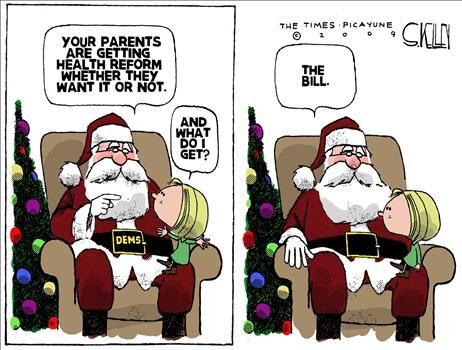by George Will
 Rushing to lock the nation into expensive health care and climate change commitments, Democrats are in an understandable frenzy because public enthusiasm for both crusades has been inversely proportional to the time the public has had to think about them. And the president pushing this agenda has, with his incontinent hunger for attention, seen his job approval vary inversely with his ubiquity. Consider his busy December -- so far.
Rushing to lock the nation into expensive health care and climate change commitments, Democrats are in an understandable frenzy because public enthusiasm for both crusades has been inversely proportional to the time the public has had to think about them. And the president pushing this agenda has, with his incontinent hunger for attention, seen his job approval vary inversely with his ubiquity. Consider his busy December -- so far.
His Dec. 1 Afghanistan speech to the nation was followed on Dec. 3 by his televised "jobs summit." His Dec. 8 televised economics speech at the Brookings Institution was followed on Dec. 10 by his televised Nobel Peace Prize acceptance speech, which was remarkable for 38 uses of the pronoun "I."
And for disavowing a competence no one suspected him of. ("I do not bring with me today a definitive solution to the problems of war." Note the superfluous adjective.) And for an unnecessary notification. ("Evil does exist in the world.") And for delayed utopianism. ("We will not eradicate violent conflict in our lifetimes." But in someone's.) And for solemnly announcing something undisputed. (There can be a just war.) And for intellectual applesauce that should get speechwriters fired and editors hired. ("We do not have to think that human nature is perfect for us to still believe that the human condition can be perfected." If the human "condition" can attain perfection anyway, human nature cannot be significantly imperfect.)
Then on Dec. 13, he was on "60 Minutes" praising himself with another denigration of his predecessor, aka "the last eight years." (Blighted by "a triumphant sense about war.") When Attorney General Eric Holder announced that five accused terrorists would be tried in federal courts, he said: "After eight years of delay. ..." When the U.S. Preventive Services Task Force made the controversial recommendation that women should get fewer mammograms, Secretary of Health and Human Services Kathleen Sebelius said: "This panel was appointed by the prior administration, by former President George Bush." In congressional testimony, Treasury Secretary Timothy Geithner almost deviated from the script. He said the Obama administration began after "almost a decade" -- slight pause -- "certainly eight years of basic neglect."
Abroad, the fruits of the president's policy of "engagement" have been meager: Witness Iran continuing its nuclear program and China being difficult about carbon emissions. Here is a history lesson for an administration which, considering itself the culmination of history, is interested only in the last eight years of it:
At the Vienna summit in June 1961, President John Kennedy, fresh from his Bay of Pigs fiasco, was unnerved by the brutal disdain of Soviet Premier Nikita Khrushchev, who considered Kennedy callow. Britain's Prime Minister Harold Macmillan astutely noted Kennedy had "met a man who was impervious to his charm."
A person can only be a novelty once, and only briefly, and charm, like any commodity, when used uneconomically becomes a wasting asset. All this is pertinent to the Senate health care debate, now coming to a curious climax amid another glut of careless grandiosity.
Supporters of the Senate bill say it will insure the uninsured. The Congressional Budget Office says 24 million of the 46.3 million uninsured will remain so. Supporters say it will lower aggregate and individual health care spending. The government's Centers for Medicare and Medicaid Services says the nation's health care spending and insurance premium costs will increase.
Today there are more independents than Democrats, more independents than Republicans, and according to a recent Gallup poll, independents' approval of the Democratic-controlled Congress (14 percent) is lower than Republicans' approval (17 percent). This is partly a function of the majority party's health care monomania. Consider what happened recently in Kentucky.
There a Republican candidate succeeded in nationalizing a state Senate race. Hugely outspent in a district in which Democrats have a lopsided registration advantage, the Republican won by 12 points a seat in Frankfort by running against Washington -- against Nancy Pelosi, Harry Reid and their health care legislation.
A CNN poll shows 36 percent of the public in favor of what the Democratic Senate is trying to do to health care, 61 percent opposed. It is clear what the public wants Congress to do: Take a mulligan and start over.
So Republicans can win in 2009 by stopping the bill, or in 2010 by saying: Unpopular health legislation passed because of a 60-40 party-line decision to bring it to a Senate vote. Therefore each incumbent Democrat is responsible for everything in the law.
George F. Will is a 1976 Pulitzer Prize winner whose columns are syndicated in more than 400 magazines and newspapers worldwide.
